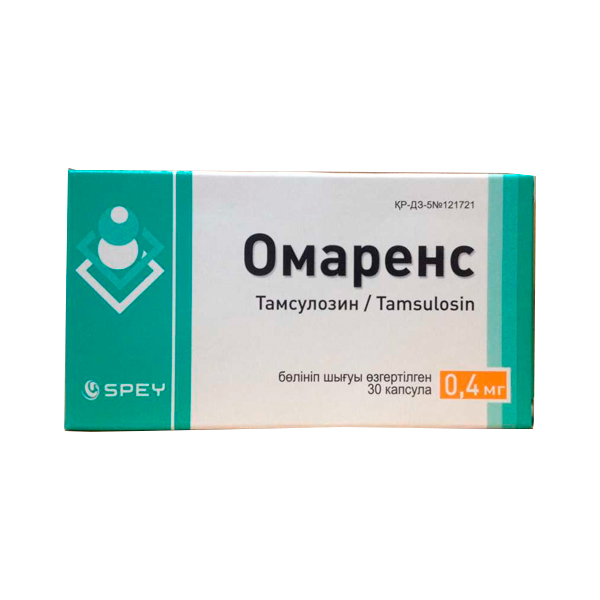
Omarens
Prescription
Download the instruction
Omeprazole in Omarens, a racemic mixture of two enantiomers reduces gastric acid secretion through a highly targeted mechanism of action.
Composition
Each gastro-resistant capsule contains:
Active substance: omeprazole – 20 mg
Excipients: Mannitol, Sucrose, Sodium laurilsulfate, Disodium phosphate anhydrous, Sodium methyl parahydroxibenzoate, Sodium propyl parahydroxibenzoate, Hypromellose, Hypromellose phatalate, Cetyl alcohol, Titanium dioxide, Sugar spheres.
Indications for use
Omarens capsules are indicated for:
Adults:
- Treatment of duodenal ulcers
- Prevention of relapse of duodenal ulcers
- Treatment of gastric ulcers
- Prevention of relapse of gastric ulcers
- In combination with appropriate antibiotics, Helicobacter pylori (H. pylori) eradication in peptic ulcer disease
- Treatment of NSAID-associated gastric and duodenal ulcers
- Prevention of NSAID-associated gastric and duodenal ulcers in patients at risk
- Treatment of reflux oesophagitis
- Long-term management of patients with healed reflux oesophagitis
- Treatment of symptomatic gastro-oesophageal reflux disease
- Treatment of Zollinger-Ellison syndrome.
Paediatric use:
Children over 1 year of age and ≥ 10 kg:
- Treatment of reflux oesophagitis
- Symptomatic treatment of heartburn and acid regurgitation in gastro-oesophageal reflux disease.
Children and adolescents over 4 years of age:
In combination with antibiotics in treatment of duodenal ulcer caused by H. pylori.
Mode of application
Posology in adults:
Treatment of duodenal ulcers: The recommended dose in patients with an active duodenal ulcer is Omarens 20 mg once daily. In most patients healing occurs within two weeks. For those patients who may not be fully healed after the initial course, healing usually occurs during a further two weeks treatment period. In patients with poorly responsive duodenal ulcer Omarens 40 mg once daily is recommended and healing is usually achieved within four weeks.
Prevention of relapse of duodenal ulcers: For the prevention of relapse of duodenal ulcer in H. pylori negative patients or when H. pylori eradication is not possible the recommended dose is Omarens 20 mg once daily. In some patients a daily dose of 10 mg may be sufficient. In case of therapy failure, the dose can be increased to 40 mg.
Treatment of gastric ulcers: The recommended dose is Omarens 20 mg once daily. In most patients healing occurs within four weeks. For those patients who may not be fully healed after the initial course, healing usually occurs during a further four weeks treatment period. In patients with poorly responsive gastric ulcer Omarens 40 mg once daily is recommended and healing is usually achieved within eight weeks.
Prevention of relapse of gastric ulcers:
For the prevention of relapse in patients with poorly responsive gastric ulcer the recommended dose is Omarens 20 mg once daily. If needed the dose can be increased to Omarens 40 mg once daily.
Treatment of reflux oesophagitis:
The recommended dose is Omarens 20 mg once daily. In most patients healing occurs within four weeks. For those patients who may not be fully healed after the initial course, healing usually occurs during a further four weeks treatment period.
In patients with severe oesophagitis Omarens 40 mg once daily is recommended and healing is usually achieved within eight weeks.
Long-term management of patients with healed reflux oesophagitis:
For the long-term management of patients with healed reflux oesophagitis the recommended dose is Omarens 10 mg once daily. If needed, the dose can be increased to Omarens 20-40 mg once daily.
Treatment of symptomatic gastro-oesophageal reflux disease:
The recommended dose is Omarens 20 mg daily. Patients may respond adequately to 10 mg daily, and therefore individual dose adjustment should be considered.
If symptom control has not been achieved after four weeks treatment with Omarens 20 mg daily, further investigation is recommended.
Treatment of Zollinger-Ellison syndrome:
In patients with Zollinger-Ellison syndrome the dose should be individually adjusted and treatment continued as long as clinically indicated. The recommended initial dose is Omarens 60 mg daily. All patients with severe disease and inadequate response to other therapies have been effectively controlled and more than 90% of the patients maintained on doses of Omarens 20-120 mg daily. When dose exceed Omarens 80 mg daily, the dose should be divided and given twice daily.
Posology in children:
Children over 1 year of age and ≥ 10 kg.
Treatment of reflux oesophagitis.
Symptomatic treatment of heartburn and acid regurgitation in gastro-oesophageal reflux disease.
Reflux oesophagitis: The treatment time is 4-8 weeks.
Symptomatic treatment of heartburn and acid regurgitation in gastro-oesophageal reflux disease: The treatment time is 2–4 weeks.
Children and adolescents over 4 years of age.
Treatment of duodenal ulcer caused by H. pylori
The treatment should be supervised by a specialist.
Impaired renal function.
Dose adjustment is not needed in patients with impaired renal function.
Impaired hepatic function.
In patients with impaired hepatic function a daily dose of 10–20 mg may be sufficient.
Elderly (> 65 years old).
Dose adjustment is not needed in the elderly.
Method of administration.
It is recommended to take Omarens capsules in the morning, preferably without food, swallowed whole with half a glass of water. The capsules must not be chewed or crushed.
For patients with swallowing difficulties and for children who can drink or swallow semi-solid food.
Patients can open the capsule and swallow the contents with half a glass of water or after mixing the contents in a slightly acidic fluid e.g., fruit juice or applesauce, or in non-carbonated water. Patients should be advised that the dispersion should be taken immediately (or within 30 minutes) and always be stirred just before drinking and rinsed down with half a glass of water.
Alternatively patients can suck the capsule and swallow the pellets with half a glass of water. The enteric-coated pellets must not be chewed.